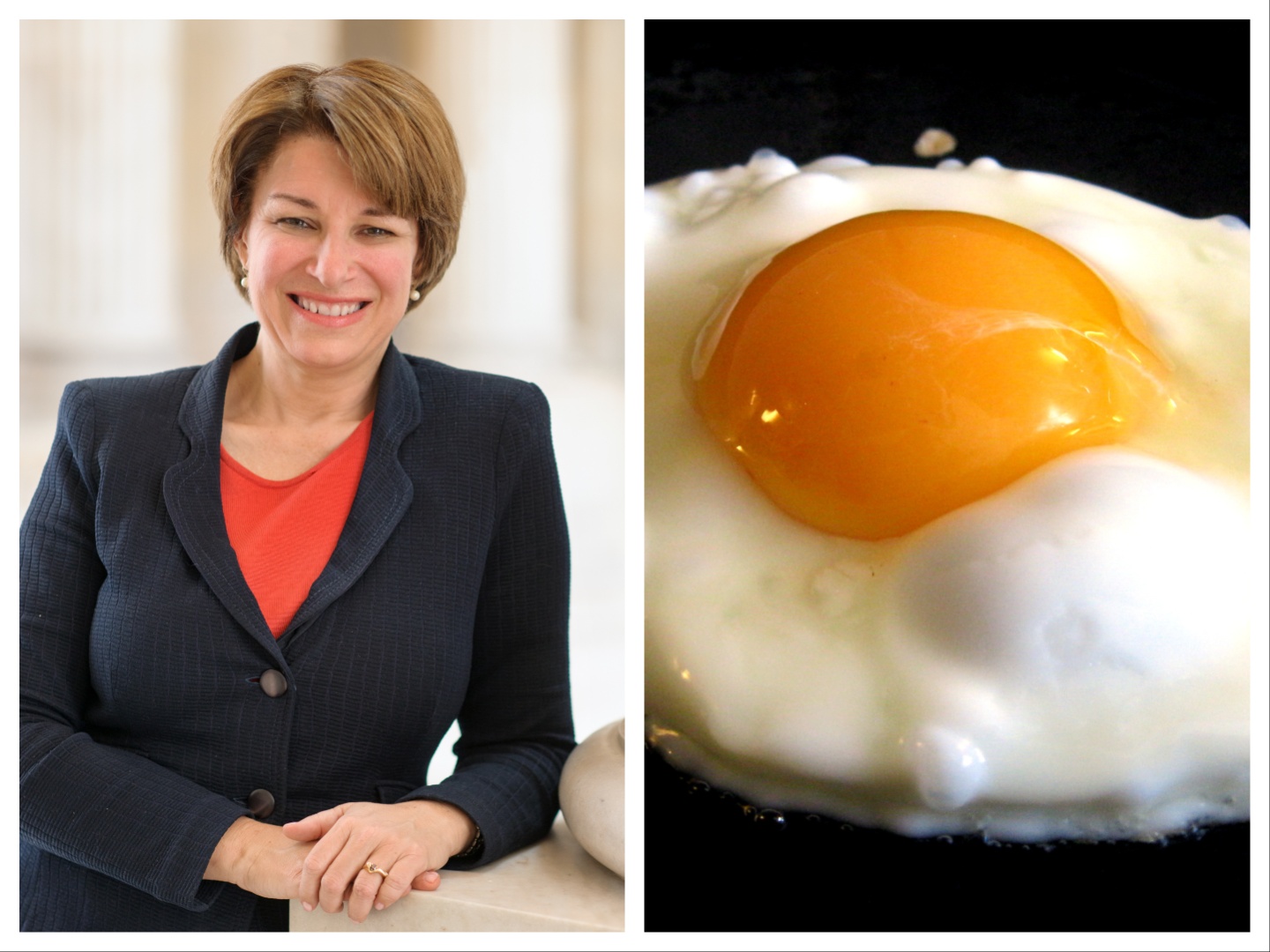Welcome back to The Flyover, your daily digest of important, overlooked, and/or interesting Minnesota news stories.
Trump Take Egg, Amy Miss Egg
An excellent headline in today’s Times: “Amy Klobuchar Can’t Stop Talking About Eggs. We Asked Her Why.” If you’ve followed our senior senator’s public appearances recently, you might also be wondering why. Whether she’s chatting with the hosts of The View or standing in the snow on Instagram, Klobuchar keeps coming back to the cost of eggs.
On one level, it’s obvious why. Congressional Democrats recognize that grocery prices were a factor in Trump’s election, and eggs are pretty damn expensive! But as a talking point it feels overly workshopped and lacking in directness, a topic Klobuchar returns to only because she thinks we care about it.
In interviews, Klobuchar doesn’t seem outraged that Trump is hurting people. Instead, she seems inconvenienced that she can’t do her job, like someone reheated fish in the break room microwave. “We’d love to work with them if they want to come work with us on child care or housing,” she tells the Times, but Trump is “trying to buy Greenland and Panama and make Canada the 51st state.”
We get that Senate Democrats want to be seen as the reasonable adults in the room, and maybe this is an effective stance—what the hell do we know? But a lot of us are frankly horrified at the speed with which the federal government is being dismantled, the military is being restaffed with loyalists, and trans people are being driven out of public life. In this context, a measured focus on kitchen table issues seems delusional, like complaining that the landlord needs to fix the sink while your apartment is on fire.
Oh, and Klobuchar fumbles the obvious question here! When asked about the price of eggs, she answers, “I’ll have to check at our local grocery store. I just got some last week, so I don’t want to give you the wrong figure.” You had one job! (She did come up with an answer later in the interview, but why not have that number on hand?)
We've not seen Klobuchar this fixated on something since...
New Bills Would Decriminalize Bong Water
It was considered groundbreaking legislation when Minnesota decided to decriminalized all drug paraphernalia in 2023. In fact, we were the first state to do so. But there was one odd exception to the new rule: bong water. Thanks to a 2009 State Supreme Court ruling that deemed bong water a controlled substance, liquid weight could still be used in determining the amount of a controlled substance on a person—a difference that can take things from misdemeanor to felony real fast.
“If someone dropped $20 worth of cocaine into a swimming pool, should law enforcement be able to weigh all the water in the pool and prosecutors charge the person with possessing that many pounds of cocaine?” asks drug reform lobbyist Kurtis Hanna when discussing the current law with Chistopher Ingraham at the Minnesota Reformer.
But if two DFL-penned bills in the House and Senate pass, bongwater, which contains about as much drug value as cigarette ash, will be a-OK. (Either way, be sure to dump your bong water in a timely manner; that stuff smells rank.)
Meanwhile, folks who were told their marijuana-related criminal records would be expunged on January 1 will now have to wait until mid-May. “It just seems that nobody cares about the people who are impacted by this,” lawyer Jon Geffen tells James Walsh at the Star Tribune. “They’ve done their sentence. But they are kept from supporting their families as records will continue to be used to deny housing and employment.”
According to the Minnesota Bureau of Criminal Apprehension, the delay is due to glitches discovered in the screening programs. Until then, about half a million Minnesotans are impacted.
Green Energy Over Red Tape?
With the deranged right-wing shitshow running things in Washington, D.C., it's easy to take your eye off the ball. But, of course, climate change remains one of humanity's greatest threats, and today the New York Times showcased a Minnesota experiment to combat it. As MPR News covered last year, Gov. Tim Walz signed a bill into law that'll streamline the permitting process behind green energy projects.
“We had projects that, quite honestly, looking at them, shouldn’t have had to go through the extensive process they did,” Walz says. A lawyer with Minneapolis law firm Fredrikson & Byron tells the Times that those types of projects typically spend between 12 and 13 months jumping through permitting hoops. Given Minnesota's goal of a carbon-neutral electric grid by 2040, time is very much of the essence.
So under the law, which goes into full effect this summer, new wind and solar installations could be expedited by six to nine months, according to the Clean Grid Alliance. There'll be two distinct categories for projects—one for large-scale gas plants and transmission lines, one for wind, solar, and batteries—and Walz says real-time tracking on permit progress could be part of the equation.
If you're not thrilled about diminishing the regulatory state to accommodate business, however, your concerns are being voiced. Some environmental groups, like the nonprofit Clean Up the River Environment (CURE), fear pollutant-heavy plants like natural gas might enjoy “less rigorous” environmental assessments under the new law, the Times reports. “For us, natural gas is not the type of carbon-free resource that we are hoping to head for with the 100 percent law,” CURE's Sarah Mooradian told MPR last year.
Still, perfect can't be the enemy of good as our winters disappear and our summers become (non-sexy) smokeshows.
Congrats, Mac Student Workers
For the Minnesota Reformer, Max Nesterak reports that 1,100 Macalester student workers voted to unionize this week, with 406 in favor and 61 against. It's not just the first undergrad student worker union of its kind in Minnesota, it's also one of the biggest unions to form in the state's private sector in "at least the past 25 years," Nesterak writes. Hell yeah!
What's next for these student organizers? For one, they'd like to push for pay above St. Paul’s $15.97/hour minimum wage, along with better training, higher dining hall staffing, and more supervisor consistency.
“What I’m really excited about [is] I think the union will bring a sense of community and togetherness among student workers,” Ava Ortiz, a sophomore library assistant, tells the Reformer.






